
APN | Doha – Amman Zoom
20 March 2024
APN delivered a presentation titled "Utilizing Food as a Tool: Starvation in Palestine as a Strategy for Subjugation and Control" at the seminar titled "Food and Water Security in the Arab World: Between Reality and Aspiration," organized by Qatar's "Green Tent" programme, and attended by a distinguished group of Arab specialists.
The presentation emphasized the significance of prioritizing food sovereignty over food security, highlighting Gaza as a prime illustration of the distinction between the two concepts. In Gaza, food is visible at the border but remains inaccessible. It stressed the imperative of upholding Palestinian sovereignty over their food and aiding them in cultivating and producing it autonomously. This entails steering clear of projects financed by foreign donors and international financial institutions that have predominantly promoted the cultivation of non-essential items intended for export, such as flowers, instead of focusing on cultivating crops with substantial nutritional and economic value, like grains.
APN discussed the occupation's systematic tactics to undermine the Palestinian agricultural sector, including the confiscation of over 85% of Palestinian water resources and land, dismantling food systems, land confiscation, tree destruction, and targeting agricultural infrastructure. It was highlighted that starvation is not a byproduct of the war but rather a deliberate tool for systematic killing. The use of food as a weapon in Palestine dates back to the establishment of the first Zionist agricultural settlement. Additionally, United Nations reports high levels of food insecurity in Palestine before 7 October 2023.
APN presented the initial assessment of losses estimated by the Food and Agriculture Organization of the United Nations (FAO), which relied on aerial and satellite surveys. These surveys indicated significant destruction, including 66,940 dunums of agricultural land in the Gaza Strip, accounting for 42.6% of the cultivated agricultural area. Additionally, 3,390 dunums of greenhouses and 626 water wells were destroyed. The port was rendered inoperative, and there were reports of burning and bombing of fishing boats, as well as attacks on animal pens, sheep and cattle farms, broiler facilities, and dairy farms, all crucial sources of animal protein.
APN underscored the significance of supporting our forthcoming projects and relief development campaigns, as part of our Million Tree Campaign in Palestine. These campaigns, aimed at rehabilitating the agricultural sector in Gaza, have been launched before, with previous activities spanning over two decades and resulting in the planting of approximately half a million fruit trees in the region. This effort is part of APN's broader mission of planting 3 million trees across Palestine. Additionally, other rehabilitation projects such as constructing collective wells and providing support to farmers through the provision of apiaries, fishing nets, seeds, and more have been undertaken.


